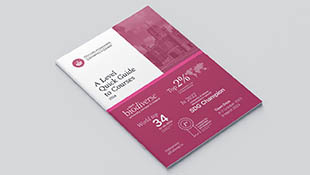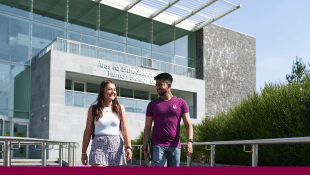-
Courses

Courses
Choosing a course is one of the most important decisions you'll ever make! View our courses and see what our students and lecturers have to say about the courses you are interested in at the links below.
-
University Life

University Life
Each year more than 4,000 choose University of Galway as their University of choice. Find out what life at University of Galway is all about here.
-
About University of Galway

About University of Galway
Since 1845, University of Galway has been sharing the highest quality teaching and research with Ireland and the world. Find out what makes our University so special – from our distinguished history to the latest news and campus developments.
-
Colleges & Schools

Colleges & Schools
University of Galway has earned international recognition as a research-led university with a commitment to top quality teaching across a range of key areas of expertise.
-
Research & Innovation

Research & Innovation
University of Galway’s vibrant research community take on some of the most pressing challenges of our times.
-
Business & Industry

Guiding Breakthrough Research at University of Galway
We explore and facilitate commercial opportunities for the research community at University of Galway, as well as facilitating industry partnership.
-
Alumni & Friends

Alumni & Friends
There are 128,000 University of Galway alumni worldwide. Stay connected to your alumni community! Join our social networks and update your details online.
-
Community Engagement

Community Engagement
At University of Galway, we believe that the best learning takes place when you apply what you learn in a real world context. That's why many of our courses include work placements or community projects.
Erasmus Traineeships
Erasmus Placements (traineeships) in companies/enterprises/organisations abroad
Erasmus offers students the opportunity to obtain a period of work experience abroad in the overall framework of their degree programme. Formerly known as Erasmus Placements, these periods abroad are now called Erasmus Traineeships.
Eligibility, deadlines and documentation for Erasmus Traineeships
GENERAL INFORMATION ABOUT ERASMUS TRAINEESHIPS
If you will be doing a work placement/internship of at least 2 months in duration, and if it is an integral and compulsory part of your University of Galway programme of study, and if you are going to be based with a company or organisation in an EU Member State (or in Croatia, Norway, Iceland, Liechtenstein, or Turkey), then you may be eligble for an Erasmus grant. The placement must be based entirely around work experience, and if it takes place in a university, then you must be working there (e.g., in an office or laboratory, or teaching English) rather than attending classes. Work placements approved for Erasmus funding are called Erasmus traineeships.
To ensure that you can be considered for a grant, you must apply in time to the International Office using the Erasmus Traineeship application form. A link to this online form will be provided by the International Office when the relevant Placement Officer or academic coordinator approves your proposed work placement and passes your details on to us.
Deadlines are as follows:
- For traineeships commencing in the period 1st September – 31st December: normally the preceding 15th July
- For traineeships commencing between 1st January and 1st August: the preceding 15th November
We understand that it is not always possible to plan so far in advance for placements that will start during Semester 2, and so we may consider later applications. However, please be aware that funding is limited, and it may run out in the course of the year as more students avail of traineeship grants. We cannot guarantee an Erasmus grant to every student who applies after the above deadlines. To improve your chances of being awarded an Erasmus grant, you are strongly advised to get your traineeship grant application to us without delay once your host organisation has confirmed that they will accept you.
If you are an undergraduate doing your PEP Placement in Europe, you should also consult the Career Development Centre website.
What other procedures must be completed before the mobility?
Please be sure to read our Handbook for Erasmus+ Traineeships!
Handbook for Erasmus+ Traineeships - Please read it carefully!
Pre-Departure Readiness Sessions
These sessions covered a number of relevant topics, including required Erasmus+ traineeship paperwork, the online Erasmus+ traineeship grant application form, and how to deal with culture shock and homesickness.
Erasmus+ Traineeship Pre-Departure Readiness Session - This is a recording of the pre-departure information session that was held via Teams on Wednesday, 1st November, 2023.
Erasmus+ Traineeship Pre-Departure Readiness Session - This is a recording of the pre-departure information session that was held via Teams on Friday, 9th June, 2023.
In brief: What forms will I need to complete?
(Please note that merely reading the information below is not a substitute for reading the Handbook!)
(i) Grant Agreement
The International Office will issue you with a Grant Agreement. This document should not be confused with the Learning Agreement. The Grant Agreement is your "contract" with University of Galway, setting out the terms and conditions of your traineeship and your Erasmus+ mobility grant. It's a four-page document that requires your signature alongside that of the institutional Erasmus+ coordinator. It is normally provided in hard copy only, but for now we are permitted to issue it electronically. It is vital that you complete, sign and return this document to the International Office BEFORE you begin your traineeship abroad.
(ii) Learning Agreement
You will be required to complete a Learning Agreement for Traineeships showing all the details of the traineeship, including the programme of activities and the expected outcomes. The various sections of this document will require input from you, from your departmental coordinator at University of Galway, and from your coordinator/mentor at your host organisation abroad. Therefore, in order to complete it, you will have to work with your University of Galway coordinator and with your mentor/supervisor abroad. Please ensure that the "Proposed Mobility Programme" section is filled out in full before presenting it to your host organisation for completion of their section, and for their signature on the last page. The "Proposed Mobility Programme" section is really important and on no account should the host organisation sign the document without reading and approving it.
Please take the time to view this short instructional video - it will take you step-by-step through the various sections of the Learning Agreement for Traineeships and show you how to complete this essential document successfully.
Please keep in mind that the details of your traineeship (choice of host organisation, content, recognition, etc.) are a matter for you and your University of Galway academic coordinator or programme director, and that the International Office has no role in organising it. The onus is on you and/or your sending discipline at University of Galway to find a suitable host organisation and draw up a Learning Agreement for Traineeships. All three parties to this learning agreement should hold a copy of that document.
LANGUAGE COMPETENCE: If you are a native English speaker or completely fluent, and you will be working through English, then your level of language competence is not A1 (beginner level) but rather "native speaker" or C2 (proficient).
A copy of the entire first section of your Learning Agreement for Traineeships (i.e., the pages relating to "Before the Mobility Period" down as far as the "commitment of the three parties") should be submitted to the International Office, but only after it has been completed in full by all parties.
Will I need insurance?
Yes. An Erasmus+ Traineeship cannot be approved by University of Galway until the student has provided evidence that they are properly insured for a number of contingencies. Please read carefully the pages in the Handbook relating to this subject (Section 2.3). You could also look at the general information about insurance for your Erasmus+ visit. Multi-trip travel insurance may not be a good idea, as the policy may have a stipulation about the maximum duration of any one trip - e.g., some of these policies will not cover a single uninterrupted stay abroad of more than 60 days. If you already hold such a policy, you might have to purchase additional or alternative cover. There are insurance policies available which are tailored to the requirements of Erasmus+ students.
You should also make sure that you hold a European Health Insurance Card. You can apply for the card, or renew your existing one, by going online. Please ensure that your EHIC will be valid for the entire duration of your mobility period abroad.
Please note that you will be required to provide details of your private insurance policy on your Erasmus+ grant agreement; without this information, your grant agreement will not be valid and you will not be eligible for an Erasmus+ grant.
Online Linguistic Support
If you will be using French, German, Italian, or Spanish as the main language of your traineeship activities (in other words, if you are undertaking the traineeship as part of your current studies in one of these languages, even if you will be teaching English), you should take an online language assessment before you go on Erasmus+, unless you are a native speaker of the relevant continental language.
You will receive a grade according to the Common European Framework of Reference for Languages. The result cannot be used to prevent you taking part in Erasmus, but if you do not do well, it might be an indication that you need to work on your language skills to bring them up to the required level. Having completed the assessment, you can avail of free online language courses. It is highly recommended that you follow such courses as a linguistic preparation for your studies abroad. Please to to the EU Academy website to access the placement tests and courses.
How will I know that my traineeship has been approved for an Erasmus+ grant?
If your traineeship is approved for Erasmus+ funding, you will receive documentation from the International Office, including the Grant Agreement for Erasmus+ Traineeships, as mentioned above. This shows the financial conditions of your Erasmus+ Traineeship and the details of your grant.
You will need to sign the Grant Agreement, and return a copy to the International Office, while keeping a copy for your own records. If we don't receive a signed copy from you before you begin your traineeship, you will not receive the Erasmus+ grant.
What else will I need to do?
- When you receive your Erasmus grant, please be sure to complete the Traineeship Grant Acknowledgment Form 23/24 and return it to the International Office. Please ensure that you enter the correct grant amount on the form, and check your bank account if you are unsure. Please use this form only if you are a student on a work placement/internship! If you are studying at a university abroad, then you should go to the Latest News page (see menu on left), where you will find the grant acknowledgement form for students on study visits.
- At the end of your traineeship, make sure that you get your host organisation/employer to fill in the Traineeship Certificate that forms the last part of your learning agreement. You will not receive your final grant instalment unless this form has been submitted to the International Office. Please note that the fields provided can be expanded and should be completed with as much detail as possible. The traineeship certificate should be filled in by your employer, not by you, and the final section, "evaluation of the trainee", is for their assessment of your performance while working with them.
- Also at the end of your traineeship, you will receive a request by e-mail for an online report, the EU survey. You should make sure to complete this, otherwise you cannot receive the final grant instalment.
If you haven't completed all the above requirements, we will not be able to pay your last grant instalment.
Downloads
-

Undergraduate Prospectus 2024 PDF (14.6MB)
-

Postgraduate Prospectus 2024 PDF (3.3MB)
-

Quick Guide to Courses 2024 PDF (1.20MB)
-

A-Level Quick Guide to Courses 2024 PDF (1.04MB)
-

Pre-Arrival Guide 2024 PDF (54.1 MB)
-
.png)
Brazil Student Guide PDF (3.2 MB)
-
.png)
Chile Student Guide PDF (3.1 MB)
-
.png)
Colombia Student Guide PDF (3.1 MB)
-
.png)
Ghana Student Guide PDF (3.4 MB)
-

Hong Kong Student Guide PDF (3.6 MB)
-

Indian Student Guide PDF (3.5 MB)
-
.png)
Indonesian Student Guide PDF (3.2 MB)
-

Malaysian Student Guide PDF (3.6 MB)
-
.png)
Mexico Student Guide PDF (3.1 MB)
-

Nigeria Student Guide PDF (3.4 MB)
-
.png)
North American Student Guide PDF (2.9 MB)
-
.png)
Panama Student Guide PDF (3.1 MB)
-

South African Student Guide PDF (3.7 MB)
-
.png)
Taiwan Student Guide PDF (4.0 MB)
-
.png)
Thailand Student Guide PDF (3.6 MB)
-
.png)
Turkish Student Guide PDF (4.2 MB)
-
.png)
UAE Student Guide PDF (3.4 MB)
-
.png)
Vietnam Student Guide PDF (3.39 MB)















